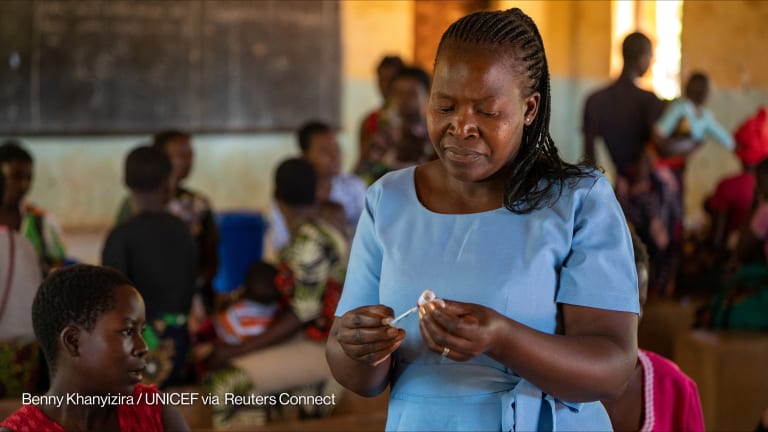Malawi is considering a local funding law. Will it help or harm INGOs?
Proponents argue the regulations will enhance effectiveness and responsiveness to local needs. However, critics warn that the law may be too restrictive and could interfere excessively with NGO operations.
In Malawi, recent legislative efforts aimed at promoting localization have sparked both optimism and skepticism among stakeholders. Proposed amendments to the Malawi NGO Bill aim to regulate international NGOs working in the country by requiring them to partner with and allocate at least 30% of the funding they spend on programs in Malawi to local NGOs as part of a global trend toward more equitable development partnerships. Failure to comply could result in hefty fines or a jail term of two years. Proponents argue that letting local organizations lead initiatives and manage funds will enhance effectiveness and responsiveness to local needs. However, critics warn that the law may be too restrictive and could interfere excessively with NGO operations. The amendments are currently under review by the Ministry of Justice. ‘Serious concerns’ The Centre for Human Rights and Rehabilitation or CHRR, a local NGO, has warned that legally requiring INGOs to form partnerships with local NGOs constitutes excessive interference in the internal governance of an organization, violates freedom of association standards, and may restrict the ability of international nongovernmental organizations to operate in Malawi. In its commentary on the amendments, CHRR argued that such requirements infringe on the right of INGOs to “determine their purposes and activities freely.” “Partnering with another NGO — whether local or international — may require significant resources and time, as well as goodwill and interest from a partner NGO. This may in some cases effectively preclude an international NGO from pursuing activities that may not be considered as essential by local NGOs,” observed CHRR. CHRR also warned against requiring an INGO to enter into a contractual relationship and to give a minimum of 30% of its funding to local partners stating it “raises serious concerns about the ability of international NGOs to freely operate in Malawi.” CHRR stated that while increasing the proportion of project activities controlled by local NGOs is a worthy goal, imposing a strict percentage is too rigid and permits arbitrary interference in the internal governance of an organization and violates its right to freedom of association and fails to take into account the differences among organizations. Pamela Kuwali, country director at CARE Malawi, said the proposed regulations have both positive and negative aspects. In an email, Kuwali said the regulations will enable INGOs to build the capacity and development of local NGOs, but the requirements to enter into a contractual relationship and allocate a minimum of 30% of their funding to local NGOs will have significant implications for organizations such as CARE Malawi. While these regulations promote stronger partnerships between INGOs and local NGOs, they offer some challenges including administrative burdens, he said. “Entering into multiple contractual relationships can increase the administrative burden on INGOs. CARE Malawi has had to invest in additional resources to manage these partnerships effectively,” Kuwali said. Localization targets have also proven to be hard to achieve. The U.S. Agency for International Development, for instance, has set a target of channeling 25% of its funding through local organizations globally by 2025. Yet USAID data shows that the agency moved backward: Last year, just 9.6% of the agency’s funding went to local groups, down from 10.2% the year before. In 2023, NGOs in Malawi received a total of 589 billion Malawian kwacha but only 4.4% of the income was obtained from partnerships. Kate Hartley-Louis, Malawi country director for Self Help Africa and co-chair of the NGO forum, said while there is a commitment to partnership, some INGOs cannot currently meet the 30% funding requirement as per the new guidelines. “All INGOs that we work with are committed to a partnership and the localization agenda. However, some organizations have concerns over the absorptive capacity of registered local NGOs that have the experience to manage the compliance requirements, particularly on large contract values,” Hartley-Louis said. Work in progress Despite the challenges, various stakeholders working in Malawi that Devex spoke to say the new regulations are in line with what they are already doing. Since the launch of its Country Development Cooperation Strategy, USAID Malawi has managed to increase its direct funding to local partners significantly — from 25% in 2021 to 45% in the 2024 financial year. According to a USAID spokesperson, the agency’s 25% target is not necessarily for individual countries, and each mission sets its own targets, aiming for ambition grounded in context. “If we are looking just at the question of direct local funding, USAID/Malawi channeled 27% of funding to local partners in the 2023 financial year. Currently, USAID/Malawi funds 50 implementing partners, of which 27 are local partners, accounting for over 45% of the bilateral program budget,” they said. The spokesperson said some of the factors that contributed to USAID/Malawi’s successes included a whole of mission approach to advance locally led, locally owned and locally managed development. They said the mission intentionally prioritizes strategic investments to systematically strengthen the capacities of local organizations to be able to effectively work with USAID. A spokesperson at Sightsavers International said partnering with local organizations has long been a cornerstone of Sightsavers’ programmatic delivery. They said the approach brings positive benefits because of the local knowledge, experience, and connection from the local NGOs adding that their partners included the Ministry of Health and other NGOs that deliver the bulk of their programs. “We always seek to support these partners with advice and expertise gained from programmes in other countries, and our relationships are supported by written agreements,” they said. “We have a range of policies and systems in place, related to due diligence and partner monitoring and reporting, to assess and support partner NGOs to confirm their performance capacity and the robustness of their management control frameworks.” Charles Chirwa, localization manager at Save the Children, said his organization's localization drive was already in line with the new regulations and so far they have already identified 41 local NGOs across the country that have been prepositioned for partnership. He said local partners already receive 30%-70% of the budget while the organization retains the balance for monitoring. “We for instance have a youth-led pilot project where 70% has been channeled to local partners and the new regulations will not affect us because they are similar with what we are advocating for under the Save the Children localization drive,” Chirwa said. He said Save the Children starts the partnership with an organization capacity assessment to identify gaps within the organization system. This is followed by a capacity development plan which is jointly done with the partner. Moses Chabuka, executive director at Neno Active Youth in Development, which is currently benefiting from the Save the Children localization pilot phase, told Devex in a phone interview the new regulations are a positive step to ensuring sustainable development. He said while there could be capacity challenges in some local NGOs, the regular capacity-building workshops by the NGO Regulatory Authority, or NGORA, and some INGOs are bridging these capacity gaps. “Of course, there is need for more capacity building in many local NGOs in terms of financial management and resource mobilization, but all in all the new regulations offer local compliant NGOs to tap these skills from the INGOs,” Chabuka said. Next steps The regulations have since been submitted to the country’s Ministry of Justice for further review and gazetting. Edward Chileka-Banda, chief executive officer at NGORA, said they could still face several challenges as localization is a new concept that has not been enforced across the sub-Saharan Africa region. “There may also be resistance within the INGOs to shift power and decision-making to local entities as building trust between INGOs and local partners can be difficult and requires time and effort,” he said. Some experts are also concerned that the lack of comprehensive data on funding flows to international organizations will complicate efforts to assess progress accurately as many INGOs and donors operating in Malawi do not publicly disclose detailed financial information, making it difficult to gauge how funds are allocated and whether they truly benefit local entities. While the NGO law in Malawi has always required NGOs to disclose their resources as well as their donors, Chileka-Banda said the amendments have revised upwards fines for organizations or individuals that contravene with provisions of the law from $ 28.82 (MWK50,000) to $2,881.86 (MK5,000,000) or a two-year jail term. He added that the new law, which will be enforced by NGORA, will require a robust monitoring and enforcement mechanism to ensure consistent compliance of the new regulations across multiple jurisdictions. But it is still unclear when the regulations will actually come into effect. “I cannot say when the new regulations shall be in force as they have been sent to the Ministry of Justice for further review,” Chileka-Banda said. “However, building capacity of local NGOs to take on roles previously managed by INGOs will be a long-term process requiring significant investment.” Chileka-Banda said donor preferences could also pose a challenge to the localization drive as donors have specific requirements that may not align with localization goals. He added that managing financial risks associated with transferring significant funding to local NGOs with varying levels of capacity could also be challenging. “Understanding the risks and challenges that the localization agenda would face, we are conducting a capacity gap assessment to identify immediate capacity gaps in the local NGOs and have them rectified by developing comprehensive frameworks and robust monitoring mechanisms,” he said. Update, July 31, 2024: This article has been updated to clarify sourcing for comments made by Pamela Kuwali, country director for CARE Malawi.
In Malawi, recent legislative efforts aimed at promoting localization have sparked both optimism and skepticism among stakeholders.
Proposed amendments to the Malawi NGO Bill aim to regulate international NGOs working in the country by requiring them to partner with and allocate at least 30% of the funding they spend on programs in Malawi to local NGOs as part of a global trend toward more equitable development partnerships. Failure to comply could result in hefty fines or a jail term of two years.
Proponents argue that letting local organizations lead initiatives and manage funds will enhance effectiveness and responsiveness to local needs. However, critics warn that the law may be too restrictive and could interfere excessively with NGO operations. The amendments are currently under review by the Ministry of Justice.
This story is forDevex Promembers
Unlock this story now with a 15-day free trial of Devex Pro.
With a Devex Pro subscription you'll get access to deeper analysis and exclusive insights from our reporters and analysts.
Start my free trialRequest a group subscription Printing articles to share with others is a breach of our terms and conditions and copyright policy. Please use the sharing options on the left side of the article. Devex Pro members may share up to 10 articles per month using the Pro share tool ( ).
Madalitso Wills Kateta is a Malawi-based Devex contributing reporter. He specializes in gender, human rights, climate change, politics, and global development reporting. He has written for the Thomson Reuters Foundation, The New Humanitarian, African Arguments, Equal Times, and others.








